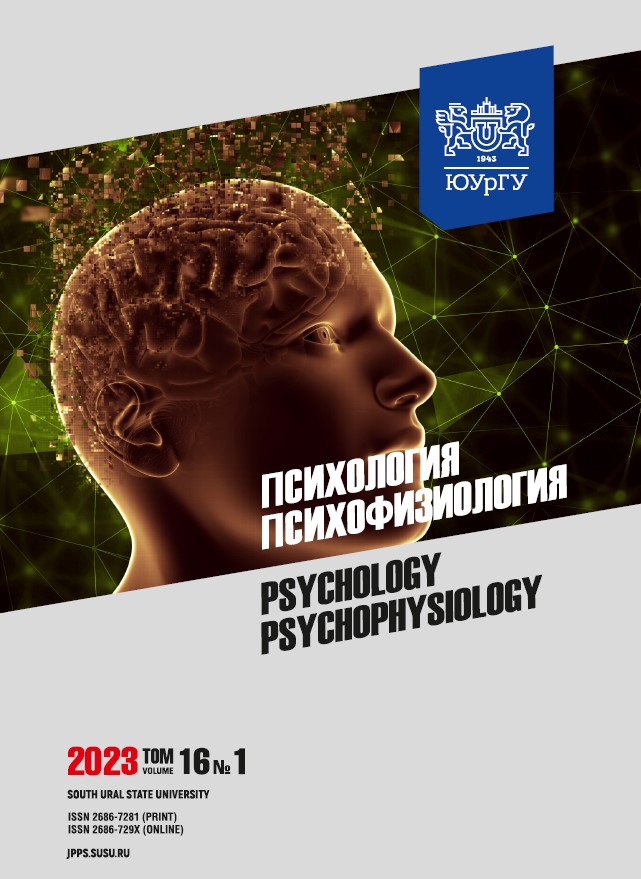Gender differences of problematic social media use
Abstract
Introduction. As soon as the digital environment is rapidly changing, it is still critical to identify common psychological characteristics that lead to problematic social media and network use, as well as gender differences that allow identifying specific vulnerability factors to the formation of this type of addictive behavior. Aim: the paper was aimed at identifying gender differences in problematic social media use among adolescent students. Materials and methods. The study involved 633 students from the Moscow region, including 358 (56.6 %) male and 275 (43.4 %) female students from 15 to 17 years of age (M = 15.5, SD = 0.68). The following methods of psychological diagnosis were used: the modified Problematic Facebook Use Scale; the time spent using social media scale; the Social Media Disorder Scale.
Results. In this population, the parameters under study showed that female students were more vulnerable to problematic social media use compared to male students and were more likely to have difficulties with controlling their time spent using social networks. Moreover, female students were more likely to spend a lot of time on social networks during emotional distraction. A longer use of social networks among male students was associated with their preferences for online communication. Unsuccessful attempts to reduce the time spent on social networks and family conflicts were also more characteristic of female students. Conclusion. Risk factors for problematic social media use that should be taken into account for the corresponding prevention programs include difficulties with emotional self-regulation, control difficulties, and cognitive preoccupation with social networks in female students, as well as a preference for online communication in male students.
Downloads
References
2. Sirota N.A., Moskovchenko D.V., Yaltonsky V.M., Yaltonskaya A.V. Development of the Russian Version of the Questionnaire for the Problematic Use of Social Networks. Konsultativnaya psikhologiya i psikhoterapiya = Counseling Psychology and Psychotherapy. 2018;26(3):33–55. (in Russ.). DOI: https://doi.org/10.17759/cpp.2018260303.
3. van den Eijnden R.J.J.M., Lemmens J.S., Valkenburg P.M. The Social Media Disorder Scale. Computers in Human Behavior. 2016;61:478-487. DOI: https://doi.org/10.1016/j.chb.2016.03.038.
4. Kolesnikov V.N., Melnik Yu.I., Teplova L.I. Internet activity and problematic Internet use in adolescence. Natsionalnyy psikhologicheskiy zhurnal = National Psychological Journal. 2019;12(1):34–46. (in Russ.) DOI: https://doi.org/10.11621/npj.2019.0104
5. Rozanov V.A., Rakhimkulova A.S. Psychological well-being of users of social networks – a problem or the possibility of early detection of negative trends? Meditsinskaia psikhologiia v Rossii = Medical Psychology in Russia. 2016;1(36). URL: http://mprj.ru (accessed 01.08.2022). (in Russ.).
6. Wartberg L., Thomasius R., Paschke K. The relevance of emotion regulation, procrastination, and perceived stress for problematic social media use in a representative sample of children and adolescents. Computers in Human Behavior. 2021;121:106788. DOI: https://doi.org/10.1016/ j.chb.2021.106788.
7. Huang C. A meta-analysis of the problematic social media use and mental health. The International journal of social psychiatry. 2022;68(1):12–33. DOI: https://doi.org/10.1177/0020764020978434.
8. Lin C.-Y., Namdar P., Griffiths M.D., Pakpour A.H. Mediated roles of generalized trust and perceived social support in the effects of problematic social media use on mental health: A cross-sectional study. Health Expectations. 2021;24:165–173. DOI: https://doi.org/10.1111/hex.13169.
9. Cataldo I., Lepri B., Neoh M.J.Y., Esposito G. Social Media Usage and Development of Psychiatric Disorders in Childhood and Adolescence: A Review. Frontiers in Psychiatry. 2021;11:508595. DOI: https://doi.org/10.3389/fpsyt.2020.508595.
10. Gorelova G.G., Inozemtsev D.V. Analysis of psychological well-being based on the parameters of behavioral activity of users of social networks. Uchenye zapiski universiteta imeni P.F. Lesgafta. 2020;2(180):489–494. (in Russ.). DOI: https://doi.org/10.34835/issn.2308-1961.2020.2.p489-494.
11. Meshi D., Ellithorpe M.E. Problematic social media use and social support received in real-life versus on social media: Associations with depression, anxiety and social isolation. Addictive Behaviors. 2021;119:106949. DOI: https://doi.org/10.1016/j.addbeh.2021.106949.
12. Sheinov V.P., Devitsyn A.S. The development of a reliable and valid social media dependence Questionnaire. Sistemnaya psihologiya i sociologiya. = Systems Psychology and Sociology. 2021;2(38):41–55. (in Russ.). DOI: https://doi.org/10.25688/2223-6872.2021.38.2.0.
13. Sheynov V.P., Devitsyn A.S. Three-factor model of social media addiction. Rossiyskiy psikhologicheskiy zhurnal = Russian Psychological Journal. 2021;3:145–158. (in Russ.). DOI: https://doi.org/10.21702/ rpj.2021.3.1.
14. Trusova A.V., Kanashov A.E., Angelovskii A.A. et al. Gender differences in individual psychological characteristics in adolescents with different levels of manifestations of Internet-dependent behavior. Voprosy narkologii = Addiction Issues. 2020;4(187):45–62. (in Russ.). DOI: https://doi.org/10.47877/0234-0623_2020_4_45
15. Kazarinova E.Yu., Kholmogorova A.B. Preferred Internet Content and Social Anxiety as Drivers of Internet Addiction in Teens and Students. Psikhologo-pedagogicheskie issledovaniya = PsychologicalEducational Studies. 2021;13(2):123–139. (in Russ.). DOI: https://doi.org/10.17759/psyedu.2021130208.
16. Ponizovskiy P.A., Skurat E.P., Trusova A.V., Shmukler A.B., Kibitov A.O. Gender differences in psychological characteristics of people with internet addiction. Socialnaya i klinicheskaya psihiatriya = Social and clinical psychiatry. 2021;2(31):33–43. (in Russ.).
17. Paakkari L., Tynjälä J., Lahti H. et al. Problematic social media use and health among adolescents. International journal of environmental research and public health. 2021;18(4):1885. DOI: https://doi.org/10.3390/ijerph18041885.
18. Buda G., Lukoševičiūtė J., Šalčiūnaitė L., Šmigelskas K. Possible Effects of Social Media Use on Adolescent Health Behaviors and Perceptions. Psychological reports. 2021:124(3):1031–1048. DOI: https://doi.org/10.1177/0033294120922481.
19. Dalvi-Esfahani M., Niknafs A., Alaedini Z. et al. Social Media Addiction and Empathy: Moderating impact of personality traits among high school students. Telematics and Informatics. 2021;57:101516. DOI: https://doi.org/10.1016/j.tele.2020.101516.
20. Marino C., Vieno A., Altoè G., Spada M.M. Factorial validity of the Problematic Facebook Use Scale for adolescents and young adults. Journal of Behavioral Addictions. 2017;6(1):5–10. DOI: https://doi.org/10.1556/2006.6.2017.004.
21. Lanovaya A.M., Fadeeva E.V. Problematic use of social media in adolescents with Internet addictive behavior: preliminary results. Psikhologiya. Psikhofiziologiya = Psychology. Psychophysiology. 2022;15(4):59–71. (in Russ.). DOI: 10.14529/jpps220406.
22. Rumpf H.J., Vermulst A.A., Bischof A. et al. Occurence of Internet addiction in a general population sample: A Latent Class Analysis. European Addiction Research. 2014;20:159–166. DOI: https://doi.org/10.1159/00035432.
References on translit
-Copyright (c) 2023 Psychology. Psychophysiology

This work is licensed under a Creative Commons Attribution-NonCommercial-NoDerivatives 4.0 International License.



